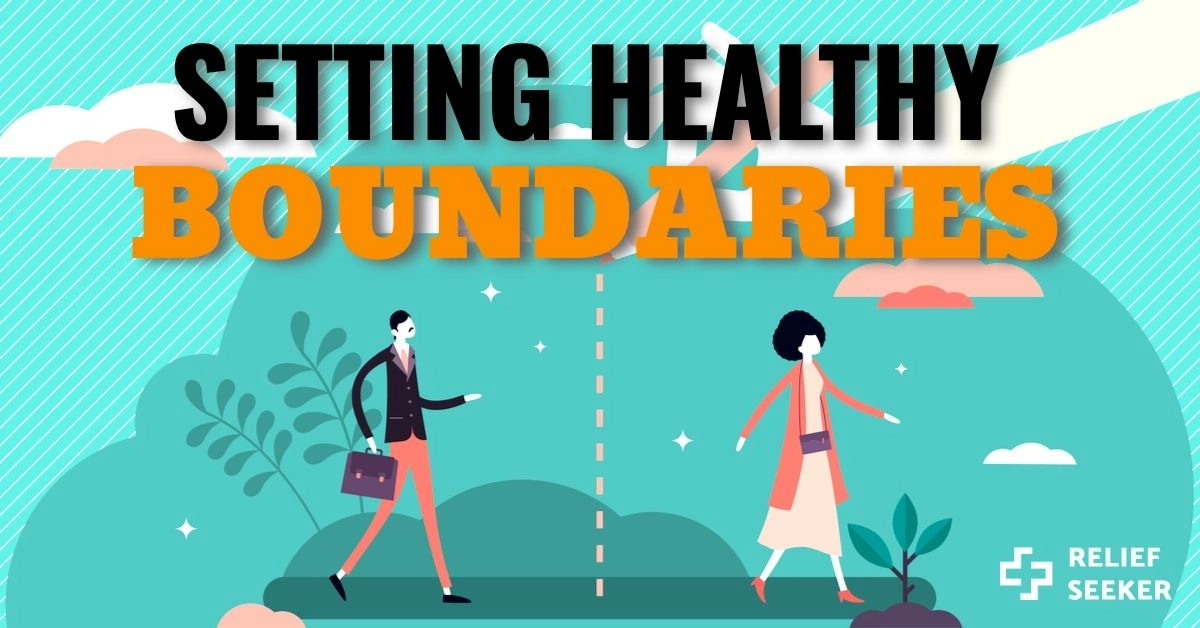Most of us know that boundaries are pretty crucial to building and maintaining healthy relationships, and let’s be honest, a healthy life. However, knowing how to set and sustain boundaries is a skill that many of us don’t inherently learn. Unfortunately, there’s not a "Boundary Setting 101" class you can take to truly identify what your boundaries might be or how to set them correctly. We learn these things from watching the people around us and picking up pointers here and there from personal experiences.
Boundary building is a relatively new concept that is incredibly important and quite challenging to understand, but the more you know, the better your relationships will be.
Boundary Basics: What Are They Exactly?
The word boundary has many definitions depending on the context, but the common thread is the thing or things that separate one person from another. You can think about boundaries as invisible bubbles that protect us. These bubbles are essential for our health, well-being, and sometimes, even our safety.
“A boundary is a limit or space between you and the other person; a clear place where you begin and the other person ends...The purpose of setting a healthy boundary is, of course, to protect and take good care of you,” says Tracey Cleantis Dwyer, a Licensed Marriage and Family Therapist (LMFT). She says that boundaries can be rigid, loose, somewhere in between, or nonexistent, and a lack of boundaries can indicate that a person may not know who they are.
Boundaries can help us establish our identity, especially healthy boundaries, as they can define a person’s individuality and what they’re willing to take responsibility for. Boundaries are often categorized as psychological, emotional, and physical. For example, declining a hug from a relative or coworker because it makes you feel uncomfortable is setting a critical physical boundary. Having healthy boundaries is crucial for proper self-care, and without them in our personal relationships, it can lead to major relationship issues, resentment, anger, and burnout.
Types of Boundaries
When it comes to setting healthy boundaries, we first need to understand the types of boundaries we’re supposed to set for ourselves. It is said that there are five types of boundaries, and to establish personal boundaries, it’s crucial to have a good understanding of who you are so that you can effectively communicate your boundaries with others. Simply put, boundaries are for and about you.
The five main boundary types include:
Physical-Personal
Emotional
Sexual
Intellectual
Financial-Material
Physical-Personal Boundaries
Physical boundaries are the limitations you have for your body, privacy, and personal space and are usually the most crucial. For example, if you’ve recently started dating someone that enjoys PDA (public displays of affection), and you’re just not into it, you will want to let them know you’re not comfortable with it, so they know kissing while in public places won’t jive. Unfortunately, this might be a deal-breaker for some, which is OK. Even though sharing your preferences might be difficult, it shouldn’t make you feel guilty. No means no.
Talking about your personal boundaries can significantly improve your relationships. Letting people know what you are and are not comfortable with can help to be around people easier as they know there are consequences if certain lines are crossed.
An example of setting a personal boundary with a friend or partner that wants to go out for the evening and you need time to chill might sound like this: “After I leave work, I need a few minutes to relax and decompress, so I will meet you 30 minutes after I arrive home.” Once the boundary has been set, your friend or partner will understand that it’s vital for your self-care, and they will honor this moving forward.
Emotional Boundaries
Emotional boundaries are just that, boundaries surrounding your emotions or the way you feel. In order for you to establish emotional boundaries, you will need to be in touch with your feelings. This might be scary, but having healthy emotional boundaries is crucial for knowing where you end, and everyone else begins. For example, suppose you’re upset about a specific situation and your partner shares the feeling. In that case, a boundary might need to be set--Some of the emotions that might arise are guilt, shame, or being undervalued. Take note of these and set a boundary around the issue that is causing these feelings.
Sexual Boundaries
This type of boundary can tie into physical boundaries, but more so refers to your expectation around physical intimacy. Most importantly, what is and what isn’t okay with you sexually. Sexual boundaries are important to set with anyone you’re engaging in sexual activities with and can be challenging to talk about. Still, they are crucial, so everyone involved knows where to draw the line.
These boundaries can include:
How often you and your partner have sex
Sexual comments
Preferred sexual acts; what’s a ‘go’ and what’s a ‘no’
Unwanted touch
Mutual consent and mutual agreement
Understanding of each other’s limits and desires
Expectations around others involved in your sex life
Setting sexual boundaries is especially critical for people who have experienced past sexual abuse as they can be triggered more easily than someone who hasn’t had similar experiences. Establishing a boundary around what is comfortable can keep your sex life happy and healthy.
Intellectual Boundaries
Intellectual boundaries are categorized by our ideas and beliefs, including boundaries around showing people respect for what they believe if it’s different than yours. These boundaries are set to protect yourself from being hurt by others’ opinions and ideas toward certain things. For example, suppose you have differing political views than your parents, and when the topic comes up, a fight always follows. In that case, this could mean a boundary should be set as it could lead to something more detrimental or scarring in the relationship with your parents.
If these boundaries aren’t set, you could become afraid to share your views and opinions with people because you are afraid of the responses you may receive, and in some cases, you could feel hurt, upset, or feel as though people don’t value your thoughts. Having intellectual boundaries can allow you to honestly share your opinions or avoid possible conflict with people who don’t share the same views.
Financial Boundaries
Financial boundaries are all about money. When it comes to setting financial boundaries, you’re putting them in place for yourself, a roommate, or with your partner.
Setting financial boundaries with yourself
These boundaries can include setting spending limits when going out with friends, on vacation, or during a shopping trip. Knowing your financial limits is essential and is the easiest to manage because, well, it’s your money. Setting boundaries around your finances is different than having financial goals, but can often be blurred.
Setting financial boundaries with a roommate
Setting financial boundaries with a person you live with usually includes each person’s monetary responsibilities, such as who takes care of the different utility expenses, rent division, or how much each person contributes if you’re sharing groceries. These things should be discussed before the move-in, and if things change should be discussed as soon as possible.
Setting financial boundaries with your partner
These boundaries are often the most uncomfortable to talk about because most people are brought up to think that discussing money is rude or taboo. However, financial boundaries with your partner are super important and should be talked about often, especially if you’re living together. Financial boundaries with your partner can include having a joint or separate bank account, how much money you put in savings each month, and the amount each of you receives for discretionary purchases. Having these talks and setting financial boundaries can set you both up for success to be on the same page where finances are involved.
Discussing your financial goals as early as possible can keep money from becoming an issue or point of contention. For example, if you’ve agreed on a specific amount to contribute to the ‘vacation’ account and your partner skips a month without telling you could make you feel upset and undervalued.
Regardless of the type of boundary, it’s essential that they exist. Boundaries help your relationships function correctly. Knowing and respecting your and others’ limits can significantly improve your relationships, keeping them healthy, fulfilling, and strong.
Benefits of Boundaries
After reading thus far, the importance of setting boundaries should (hopefully) be pretty straightforward, but what are the benefits of setting appropriate boundaries? Like we touched on a bit earlier, the word boundary can mean different things and can be kind of misleading. But, when we keep in mind that boundaries are drawn to protect us and are connecting points, it becomes more apparent that they ultimately provide healthy rules for relationships.
Some of the benefits of boundaries are:
Improved self-esteem
Boundaries allow you to prioritize yourself, putting you and the things that are important to you in the driver’s seat rather than on the back burner. Boundaries protect relationships from becoming unsafe, toxic, and bring us closer together.
Help us conserve our emotional and mental energy
We all have different thresholds when it comes to the time spent focusing on others. If boundaries aren’t set around your emotional energy, it can be easy to burnout, not giving yourself enough time to recharge.
Give us space to grow, be vulnerable, and be more independent
Setting boundaries can be difficult, especially if you’re prone to putting everyone else above yourself. When you set boundaries, you’re telling people what matters to you, making being open and honest with your friends and family more comfortable. This shows people that you can be vulnerable with them, and they’re welcome to do the same thing if/when they need to.
How To Set Healthy Boundaries
Unfortunately, setting boundaries isn’t cookie-cutter. Boundaries are very personal choices and vary from person to person, and on top of that, they evolve as we grow and get older. Something that might be important to you now may not be as important in five years. Or the way you feel about a specific issue in one relationship may not exist in the next relationship. To put things in laymen’s terms, boundaries change, and we should continuously evaluate the boundaries we set for ourselves and others.
If you’re looking for some full-proof tips on setting healthy boundaries, we’ve done a bunch of trolling for you on the topic via the world wide web. What we found is that you can begin to start setting strong boundaries in just five steps.
Know your limits and tune into your feelings
Identifying your physical, emotional, mental, and intellectual limits is the first step to set strong boundaries, so knowing where you stand on these issues is crucial. Think about the things you can tolerate and what makes you feel stressed or uneasy.
Think about how certain situations make you feel on a scale from one to ten, and if you feel stronger than a six about any situation, that’s probably a good indication for a boundary to be put in place.
Be direct and assertive
When you’re establishing boundaries with people, it’s easiest if you’re direct as possible to make the conversation run smoothly. Using I phrases, like “I feel this way when you do this thing, and I feel like we need to set a clear boundary for our relationship to remain healthy.
Try not to dance around the situation or discount your feelings. There is more room for error if this happens. Remember, boundaries are there to protect you.
Give yourself permission
Many people feel fearful, guilty, or doubt themselves when they’re setting boundaries as it’s easy to forget that you’re doing this for the well-being of you and the preservation of your relationships.
Allow yourself to feel proud when setting healthy boundaries; they’re a sign of self-respect. Give yourself the grace and permission you deserve to set appropriate boundaries; your relationships will thank you.
Seek Support
Identifying when and how to set boundaries can be challenging. If you’re having a hard time with boundaries, it may be time to find help.
Talking to trusted friends, family, or an online support group can be a good place to start. These are best for those looking for people to help hold them accountable. For help finding support groups, check out Wisdo. Wisdo is an app that we highly recommend! We love it because of its ease in connecting people to support groups that are dealing with the same or similar issues.
Another way to find help setting healthy boundaries is through online therapy (Check out our list of options here). Online therapy has become one of the best ways to connect with a licensed therapist in the comfort of your home. Again, we’ve done some heavy-lifting and recommend, Talkspace as our #1 choice for online therapists. Talkspace therapists will work with you on setting the healthy boundaries you want to implement and provide the support you need to maintain them.
Start small
Setting boundaries takes practice and time. It is suggested by many therapists to take baby steps. Start with a small boundary, then build-up to the more challenging boundaries.
Boundary setting takes courage and support; don’t be afraid to ask for help.
That’s A Wrap on Boundaries
Setting healthy and strong boundaries is critical for relationships and an important part of self-care. Appropriate boundaries can vary, but they’re necessary for your mental health and well-being.
While creating boundaries for yourself is extremely important, it’s also good to remind yourself that it can be even more critical to respect others' boundaries, including co-workers, children, parents, and romantic partners. Showing respect is a two-way street; if you respect others, they will hopefully show you the same respect.
Boundaries are put in place to protect us. They might feel scary, but with the support and respect from those around you, boundaries can be the glue that holds your relationships together.


